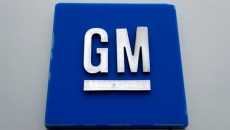OTTAWA - Canada's omission from a military pact involving three of its closest allies is symptomatic of a larger problem in how this country is perceived by its friends, experts are warning, as the U.S., Britain and Australia move ahead on their deal.
U.S. President Joe Biden, British Prime Minister Rishi Sunak and Australian leader Anthony Albanese were at a naval base in San Diego on Monday to confirm the next steps of the trilateral agreement, known as "AUKUS" after the three countries involved.
NEW: The first generation of #AUKUS nuclear-powered submarines will be built in the UK, based on the UK’s world-leading submarine design.
— Rishi Sunak (@RishiSunak) March 13, 2023
Great news for British jobs and great news for global security.
Join me as I deliver remarks on the Australia-United Kingdom-United States Partnership. https://t.co/j89cyIKlan
— President Biden (@POTUS) March 13, 2023
That includes formalizing American and British plans to help Australia develop a fleet of nuclear-powered submarines in response to growing concerns about China's actions in the Indo-Pacific region.
The Trudeau government has downplayed the importance of AUKUS to Canada, saying Ottawa is not in the market for nuclear-powered submarines, even as others have lamented its absence.
Those include a senior Canadian Armed Forces commander, Vice-Admiral Bob Auchterlonie, who worried in a recent interview with The Canadian Press about Canada not having to the same cutting-edge technology as three of its closest allies.
The head of the association representing Canada's defence industry, who criticized Prime Minister Justin Trudeau for dismissing AUKUS as simply a "nuclear-submarine deal," has also warned about the potential impact on Canadian military exports.
Canada's exclusion is being seen as further evidence that its allies do not believe Ottawa is not serious about pushing back against Chinese ambitions, despite the recent release of a new Indo-Pacific strategy late last year.
"Because of the pace of events that are unfolding in the Indo-Pacific area, our partners are moving on with essentially a clear direction in mind," said Canadian Forces College professor Paul Mitchell, an expert on naval strategy and U.S. defence policy.
"Whereas Canada, it's issued its Indo-Pacific strategy. But I think the trouble that the country has right now is that while it has a 'strategy,' it really hasn't decided what it wants to accomplish in the Indo-Pacific area."
The strategy seeks to find a balance between confronting and co-operating with China, saying Canada will challenge it "in areas of profound disagreement" while working on together on areas of shared interest such as climate change.
That compares to the U.S., where Defense Secretary Lloyd Austin in a defence strategy released earlier this month described "an increasingly aggressive China" as a "generational challenge" and the American military's top priority.
"What are we trying to accomplish here?" Mitchell said. "That's the thing that really mystifies a lot of people. With the United States, there's clearly an end there in terms of backing up its regional hegemony in the area and support to rules-based order."
Former Canadian ambassador to China David Mulroney credited Australia with having initiated AUKUS after serious consideration about its future as a middle power in a world — and region — that China is seeking to dominate.
This reflects not only Australia's more realistic and innovative approach to diplomacy, Mulroney said, it is also the product of Canberra's willingness to invest the necessary resources in making such a partnership become reality.
Numbers remain uncertain, but Australia is reportedly poised to spend billions as part of the deal to purchase new submarines. Britain and the U.S. are also expected to put money into the agreement for technology development, training and other areas.
"Canada was once a font of similarly bright and ambitious ideas and was consistently willing to contribute to their realization," he said. "Sadly, we're now no longer even part of the conversation."
Defence analyst David Perry of the Canadian Global Affairs Institute noted the U.S., Britain and Australia are all spending two or more per cent of their national gross domestic product on defence, compared to less than 1.3 per cent in Canada.
They also have solid plans to build new submarines, while Ottawa has yet to even commit to replacing the Royal Canadian Navy's four trouble-plagued Victoria-class vessels, let alone start work on plans to build or buy a new fleet.
That is despite military commanders having repeatedly underscored the need for submarines, including chief of the defence staff Gen. Wayne Eyre last week.
"It's an indicator that even among some of our closest allies, shared past experience and common history is not going to continue to get us invited to meetings as it may have in the past," Perry said.
"It's not a talk shop or a forum for getting together and having meetings. It's a venue through which countries that are looking to make serious investments to deal with serious problems in their security relations are going to do so."






